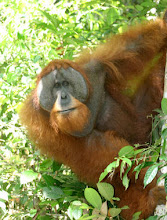During my time in Sumatra I also had the opportunity to go along to a school visit. SOS supports OIC so they can visit local schools, show presentations  and films, have Q&A sessions, hand out activity books and even maintain a OranguVan –which contains mobile environmental libraries and film units. The school we visited is situated in the midst of a massive oil plantation area. Most of the children attending this government run school have parents who work on the plantations, making them the perfect target group for addressing local sustainable issues such as Palm Tree plantations and de-forestation. The group we met are called the Green Group, they meet every Wednesday to discuss environmental issues, recycle and do gardening work in their school garden. They run their own pioneering composting programme where they are turning palm oil branches into compost. These branches fall off the trees at regular intervals, and are usually left to rot or collected and incinerated. The children are collecting the branches with support from the plantation and creating good quality compost which they can use at their schools patch of land or take it home to their kitchen gardens. One idea we thought about when we were at the school, was if it is possible to extend this programme to other schools in the area and create our own compost to use on re-forestation sites. I’ll let you know if anything ever comes from this initial thought.
and films, have Q&A sessions, hand out activity books and even maintain a OranguVan –which contains mobile environmental libraries and film units. The school we visited is situated in the midst of a massive oil plantation area. Most of the children attending this government run school have parents who work on the plantations, making them the perfect target group for addressing local sustainable issues such as Palm Tree plantations and de-forestation. The group we met are called the Green Group, they meet every Wednesday to discuss environmental issues, recycle and do gardening work in their school garden. They run their own pioneering composting programme where they are turning palm oil branches into compost. These branches fall off the trees at regular intervals, and are usually left to rot or collected and incinerated. The children are collecting the branches with support from the plantation and creating good quality compost which they can use at their schools patch of land or take it home to their kitchen gardens. One idea we thought about when we were at the school, was if it is possible to extend this programme to other schools in the area and create our own compost to use on re-forestation sites. I’ll let you know if anything ever comes from this initial thought.
In our presentation we discussed the importance of water, especially clean water, for the ecology and how this affects both animals and humans. We then had a Q&A session where we got to test their environmental knowledge, and they got the chance to ask us about environmental issues and of course about our countries – after all, it’s not every day they have a visit from two English people, a Norwegian and an Australian. We also had the chance to hand out a new children’s book which SOS has helped fund; Teman Hutan, which was very popular with the young conservationists.
The book is printed in English and Bahasa Indonesia, and tells the story of Pongo, the orangutan. It is a great way of explaining to children why the rainforest is so important for the orangutans and the other wildlife who depend on the Sumatran forest. Check out Captain Freddie’s website for more information.
Catch you later,
Ida







No comments:
Post a Comment